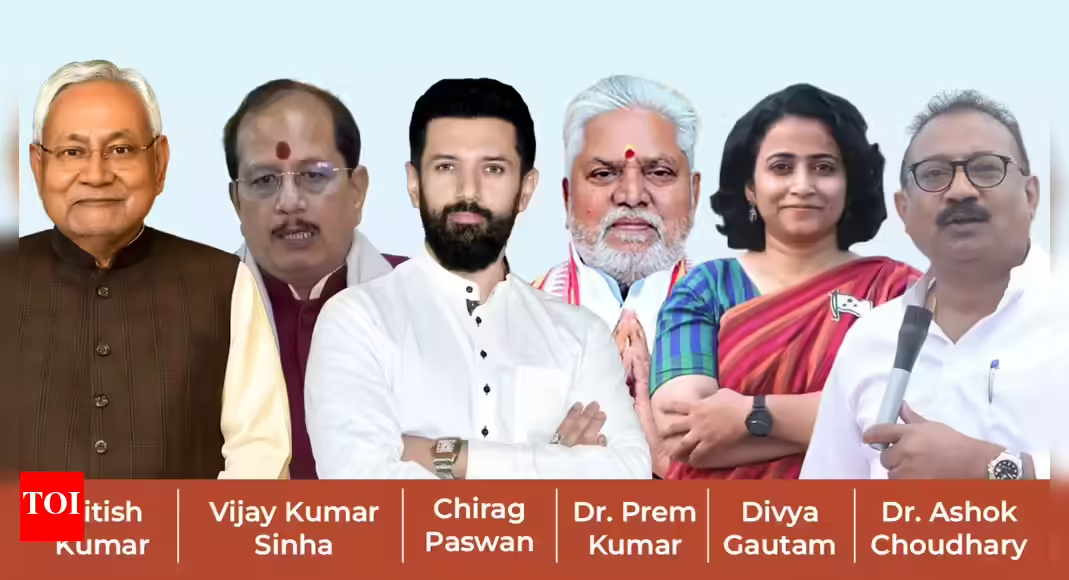Bihar Election 2025: What do Bihar’s top leaders bring in terms of degrees?

Today, as votes are being counted for all 243 seats of the Bihar Assembly, the spotlight is firmly on alliances, caste arithmetic and swing constituencies. But quietly—almost as a counter-narrative to the feverish ticker bars—another question is circulating through student groups, coaching hostels and parent WhatsApp chats: What have Bihar’s netas actually studied, and does it show in how they govern? Counting day is when manifestos are set aside and leadership is judged in sharper relief. For a state where lakhs of young people fight brutally competitive entrance exams every year, the academic pedigree of those who shape education, jobs and skilling policies is more than a trivia point, it is a governance question. Here is the list of some of Bihar’s most academically qualified political leaders in 2025.
First-Time Woman Voter in Danapur Explains Why Nitish Kumar Scored Massive Landslide Win in Bihar
The data has been drawn from their Election Commission of India (ECI) affidavits, which list each candidate’s self-declared education category and named degrees. Wherever available, these are read alongside Bihar Vidhan Sabha and Vidhan Parishad profiles that record a legislator’s highest qualification, and official institutional biographies or consistently reported reference profiles that spell out the institutes and courses. Name
Party
Highest qualification
Institute
Current Political Status
Divya GautamCPI(ML) LiberationTwo MAs; PhD (Gender & Communication) in progressPatna University; TISS Hyderabad; Nalanda Open University; BITS PilaniCPI(ML) candidate from Digha (Patna) in the 2025 Assembly elections: INDIA bloc Dr. Ashok ChoudharyJD(U)PhDMagadh University; MA from Patna UniversitySenior JD(U) leader; Minister in Bihar govt (Rural Works); MLCDr. Prem KumarBJPPhD in HistoryMagadh University, GayaEight-time MLA from Gaya Town, former cabinet minister; senior BJP leaderNitish KumarJD(U)B.Sc (Engineering), Electrical EngineeringBihar College of Engineering, Patna (now NIT Patna)Chief Minister of Bihar; leading the NDA coalition into the 2025 pollsChirag PaswanLJP (Ram Vilas)Graduate (attended B.Tech in Computer Engg; did not complete)IET, Bundelkhand University, Jhansi; NIOSUnion Minister of Food Processing Industries, MP (Hajipur); national president, LJP(RV)Vijay Kumar SinhaBJPDiploma in Civil EngineeringGovernment Polytechnic, BarauniDeputy Chief Minister of Bihar, MLA from Lakhisarai; contesting again in 2025
Assembly Election 2025: The signals hidden in Bihar’s education-to-power pipeline
If one reads Bihar’s political class through the prism of their educational journeys, a more layered picture emerges—one that quietly complicates the easy binaries of ‘old guard vs new faces’ or ‘ruling alliance vs opposition’. Consider the range within this list alone. There is a CPI(ML) candidate like Divya Gautam, who arrives with two master’s degrees, research training across TISS and BITS Pilani, and a teaching profile that mirrors the aspirations of thousands of Bihar’s urban, first-generation learners. Then there is Dr Ashok Choudhary, a senior JD(U) figure with a doctorate from Magadh University whose career arc blends academic credentials with old-school organisational politics. Dr Prem Kumar, the BJP veteran with a PhD in History, stands as a reminder that scholarly depth did exist in earlier political generations, even if it rarely shaped public perception. Nitish Kumar’s engineering degree—earned long before NIT Patna became a brand—signals a technocratic sensibility that once informed his first wave of governance reforms.Chirag Paswan’s incomplete engineering stint, juxtaposed with his current position as a Union minister, captures the unpredictability of political mobility in India, where degrees may open doors but legacy, charisma and electoral arithmetic often decide who walks through them. And Vijay Kumar Sinha’s civil-engineering diploma reflects the large cohort of leaders whose technical education fed into student politics, eventually pulling them into full-time public life. Taken together, these trajectories show how education in Bihar’s politics is neither a linear merit ladder nor an irrelevant footnote—it is a subtle signalling device.This list reveals which leaders arrived through institutions, which through mass politics, which through family legacies, and which through the rugged self-invention that Bihar’s political soil allows. More importantly, it shows that academic credentials are distributed across party lines: The NDA may dominate the electoral map today, but academic heft is not restricted to those in power. This diversity of educational backgrounds is not a measure of competence by itself, but it does hint at the varied intellectual frameworks through which Bihar’s next set of leaders will interpret policy, governance and the everyday crises of a state that produces some of India’s most ambitious students—and some of its most complex political debates.
Why education in politics matters for students
For students watching the counting day drama, it is tempting to reduce politics to seat tallies and chief ministerial faces. But education—theirs and their leaders’—will directly shape the next five years of:
- Hiring of teachers and faculty in government schools and colleges
- Funding and expansion of state universities and polytechnics
- Scholarship schemes, coaching regulations and entrance reforms
- Job-linked skilling programmes and how seriously they are monitored
Leaders with deeper academic exposure are not automatically better administrators. But they may be better placed to read complex policy notes, ask informed questions of bureaucrats and experts, and understand why an exam-paper leak or a delayed scholarship disbursal is not just a “law and order” issue but a systemic governance failure.





